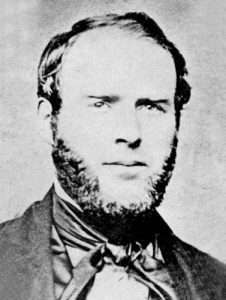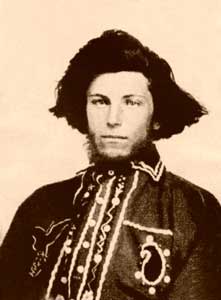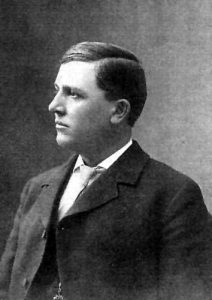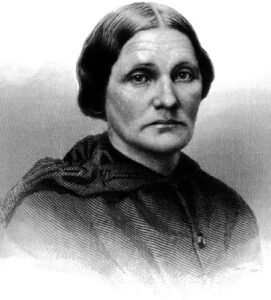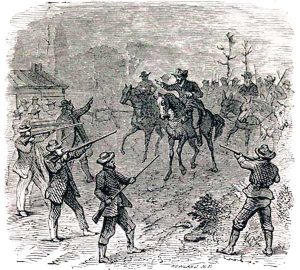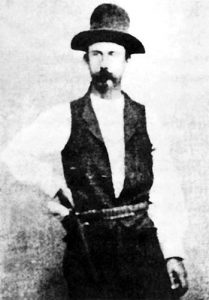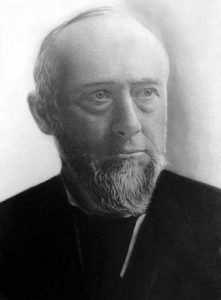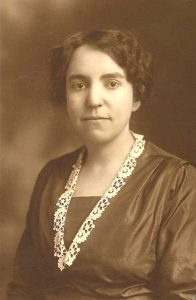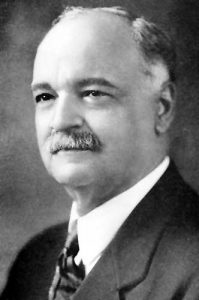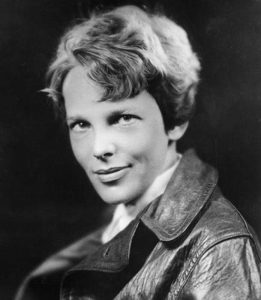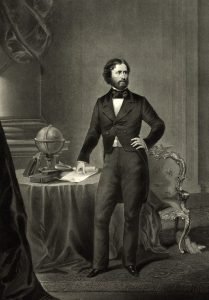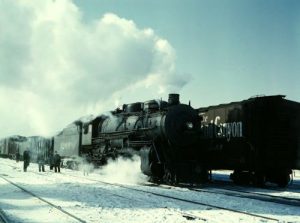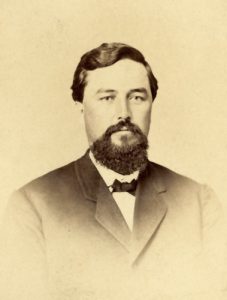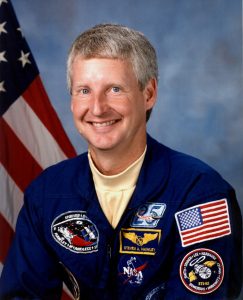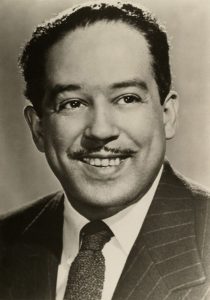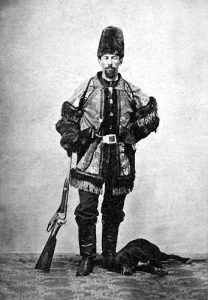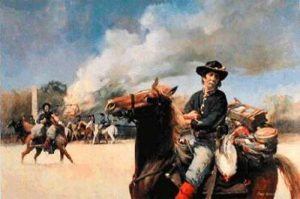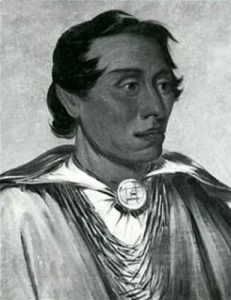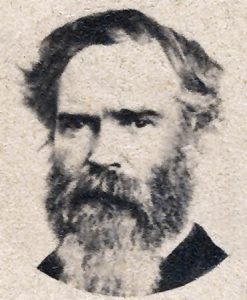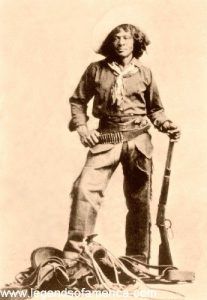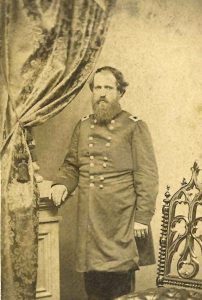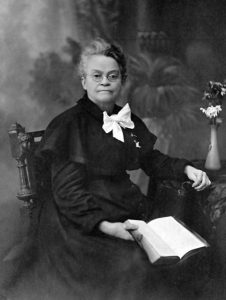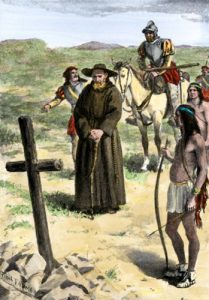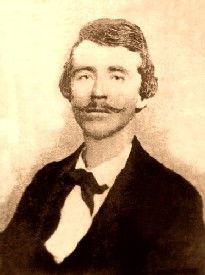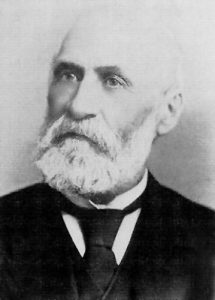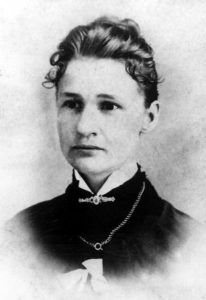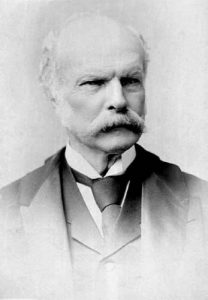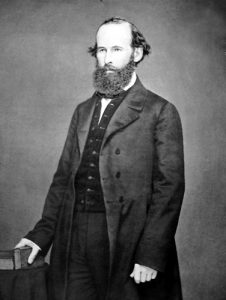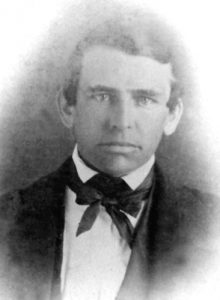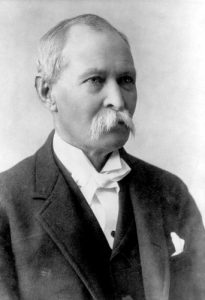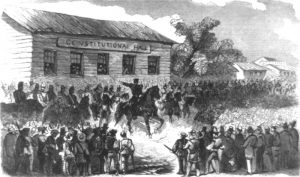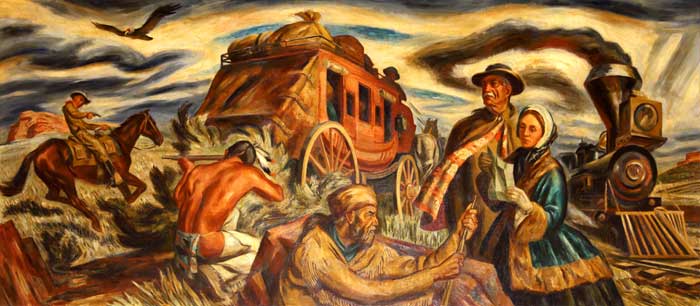
“Pioneers in Kansas,” mural by J. Ward Lockwood, a Kansas native, hangs in the U.S. Federal Building in Wichita, Kansas. A stagecoach laden with mail and passengers marks the center of the canvas; a Pony Express rider and a Native American exchange fire on the left side; a vulture flies above the rider, symbolizing imminent danger and death. A pioneer couple stands on the right; a black steam engine emerges behind the couple, symbolizing continued Western expansion.
You can never really escape. It goes with you wherever you go. Somehow, the prairie dust gets in your blood and flows through your veins until it becomes a part of you. The vast stretches of empty fields, the flat horizons of treeless plains. The simplicity of the people—good, earnest people. The way they talk and the way they live. The lack of occurrence, lack of attention, lack of everything. All that—it’s etched into your soul, and it colors the way you see everything, and it becomes a part of you.
― P.S. Baber, Cassie Draws the Universe
A
James B. Abbott (1818-1879) – Kansas pioneer, Free-State partisan, and soldier.
Franklin George Adams (1824-1899) – A Free-State advocate, teacher, attorney, and publisher.
Edward “Eddie” J. Adams (1887-1921) – A Kansas bootlegger, car thief, and murderer, Adams was eventually captured and sentenced to life imprisonment. He escaped custody twice and was killed in a shootout with police in Wichita, Kansas, on November 22, 1921.
Henry J. Adams (1816-1870) – A lawyer, Free-State advocate, politician, and soldier.
Henry J. Allen (1868-1950) – A publisher, governor, and U.S. Senator.
John Alexander Anderson (1834-1892) – A minister, congressman, and president of the Kansas State Agricultural College in Manhattan, Kansas.
William “Bloody Bill” Anderson (1839-1864) – One of the most daring, brutal, and bloodthirsty guerrilla captains who harassed Kansas during the early years of the Civil War.
Charlie Angell, Sr. (1881-1927) – Inventor of several agricultural improvements to machinery.
Andrew Jackson Anthony (1830-1919) – Anthony was a stagecoach driver, merchant, rancher, and founding member of Dodge City, Kansas.
Daniel R. Anthony (1824-1904) – A journalist, soldier, and politician from Leavenworth.
Daniel R. Anthony, Jr. (1870-1931) – A journalist and politician from Leavenworth.
Susan Brownell Anthony (1820-1906) – Leader in the American Anti-Slavery Society, she later turned her life’s devotion to women’s suffrage and, with Elizabeth Cady Stanton, founded the National Woman Suffrage Association and the newspaper Revolution.
George Tobey Anthony (1824-1896) – Soldier, politician, and the seventh governor of Kansas.
David Rice Atchison (1807-1886) – U.S. Senator and supporter of the Kansas-Nebraska Act, leader of border ruffian raids into Kansas Territory. Atchison, Kansas, is named for him.
B
Willis Joshua Bailey (1854-1932) – U.S. Representative and Sixteenth Governor of Kansas.
Thomas W. Barber (1814- 1855) – A free state supporter, was shot and killed by a pro-slavery advocate.
Charles “Charlie” C. Bassett (1847-1896) – One of the many men who served the law in the wicked little town of Dodge City, Kansas.
Clarence Batchelor (1888-1977) – Received a Pulitzer Prize in 1937 for editorial cartoons.
Olive Ann Beach (1903-1993) – An aircraft manufacturer and philanthropist.
Walter H. Beech (1891-1950) – An aircraft manufacturer and philanthropist.
Hamilton Butler Bell (1853-1947) – Sheriff of Ford County, Kansas, for three decades following lawman Bat Masterson. He arrested more alleged outlaws with a warrant than any other lawman in the West.
Mary “Mother” Bickerdyke (1817-1901) – Mary A. Bickerdyke, generally known as “Mother Bickerdyke,” served as a nurse during the Civil War. At its close, she came to Kansas and assisted soldiers who were left without employment to come to Kansas and take homesteads. Through her efforts, aid was given to settlers after Indian raids, and she assisted in securing aid for Kansas settlers after the grasshopper invasion. The Mother Bickerdyke Home for soldiers’ widows at Ellsworth was named in her honor. After a life of great activity, she died in 1901.
James G. Blunt (1826-1881) – Physician and abolitionist who rose to Union Major General during the Civil War.
Blackbear Bosin – (1921-1980) – An artist of Kiowa– Comanche ancestry.
Justin De Witt Bowersock (1842-1922) – U.S. Congressman and businessman from Lawrence.
Charles H. Branscomb – Along with Charles Robinson, Branscomb was one of Lawrence’s founders and a Free-State advocate.
Jacob Branson – One of the early settlers of Douglas County, a Free-State advocate arrested by Sheriff Samuel J. Jones.
David J. Brewer (1837-1910) – Jurist, U.S. Supreme Court Justice.
John R. “Doc” Brinkley ( 1885-1942) – Famous for his goat gland transplants, gubernatorial candidate, and pioneer radio broadcaster.
Joseph L. Bristow – (1861-1944) – Editor and U.S. Senator.
Gwendolyn Brooks (1917-2000) – Pulitzer Prize-winning poet from Topeka.
William L. “Buffalo Bill” Brooks (1832-1874) – Lawman turned outlaw, Brooks served as Marshal in Newton and Dodge City, Kansas, before being arrested for horse theft. He and two other men were lynched by a vigilante mob in Caldwell, Kansas, on July 29, 1874.
Earl R. Browder ( 1891-1973) – American Communist Party leader and presidential candidate from Wichita.
Cleyson Brown (1872-1935) – Utility and telecommunications pioneer from Abilene.
Esther Brown ( 1917-1976) – Civil rights advocate from Kansas City.
Henry Newton Brown (1857-1884) – Brown fought with the Regulators in the Lincoln County War of New Mexico. Later, he became a marshal in Caldwell, Kansas. While serving as a lawman, he made a failed attempt to rob a bank in Medicine Lodge, Kansas, on April 30, 1884. He was immediately captured and hanged the same day by vigilantes.
John Brown (1800-1859) – Abolitionist who advocated and practiced armed insurrection to end all slavery. He led the Pottawatomie Massacre in 1856 in Bleeding Kansas and made his name in the unsuccessful raid at Harpers Ferry, West Virginia, in 1859.
Blanche K. Bruce – First African American graduate of the University of Kansas in 1885.
Abram B. Burnett (1811-1870) – Potawatomi chief.
Pardee Butler (1816-1888) – An abolitionist minister from Atchison.
C
John Calhoun (1806-1859) – The first surveyor-general of Kansas and a pro-slavery partisan.
George Campbell (1848-??) – Lawyer, author, and politician.
Jacob Cantrell (18??-1856) – An early settler of Douglas County, Cantrell was killed by pro-slavery advocates.
Arthur Capper (1865-1951) – Publisher, governor, and U.S. Senator.
Frank Carlson (1893-1987) – From Concordia, Carlson served in the U.S. House of Representatives, U.S. Senate, and governor.
Frank Carney (1938-present) – With his brother, Dan, he established the first Pizza Hut Restaurant in Wichita, Kansas, after borrowing $600 from their mother. Two years later, they franchised their first Pizza Hut restaurant in Topeka.
Thomas Carney (1828-1888) – A businessman in Leavenworth, Carney became the second governor of Kansas.
Elizabeth Simerwell Carter (1835-1883) – One of the pioneer mission teachers of Kansas.
George Washington Carver (1864-1943) – An agricultural scientist, Carver mortgaged his Kansas homestead to go to college.
Pedro De Castaneda – A chronicler of the Coronado Expedition to Quivira.
Sterling G. Cato (??-1867?) – A pro-slavery advocate and Associate Justice of the Territory of Kansas.
Clyde Cessna ( 1879-1954) – Airplane manufacturer from Wichita.
Charles Joseph Chaput (1944-present) – From Concordia and of French-Canadian and Potawatomi heritage, he was the first American Indian to lead an American diocese.
Mabel Chase ( 1876-1962) – First female sheriff in Kansas.
Nick Chiles – Editor of the longest-running African American newspaper in the nation, the Plaindealer, established in Topeka in 1899.
Walter Percy Chrysler (1875-1940) – Born in Wamego and raised in Ellis, Chrysler was a machinist, railroad man, automotive industry executive, and founder of the Chrysler Corporation.
George Washington Clarke – A pro-slavery border ruffian, Clarke was involved in several Bleeding Kansas skirmishes before being permanently driven from the state in 1858.
Sidney Clarke (1831-1909) – One of the early Congress members from Kansas and a Free-State advocate.
Clark Clifford (1906-1998) – From Fort Scott, Clifford served as special counsel to President Truman and as Secretary of Defense.
Nellie Cline – (1886-1984) – Lawyer and the first woman to present oral arguments before the Kansas Supreme Court. Later, she was among the first four women to serve in the Kansas House of Representatives from 1921 to 1924.
William F. Cloud (1825-1905) – Soldier and Indian fighter in Kansas, Could County is named in his honor.
William F. “Buffalo Bill” Cody (1846-1917) – Raised in Leavenworth, Cody was a Pony Express rider, buffalo hunter, soldier, scout, and “Wild West Show” promoter.
Don Coldsmith ( 1926-present) – Physician, professor, and author of several western fiction books and articles.
William Comstock (1842-1868) – A scout on the central plains in the days of the Old West, he was celebrated by contemporaries for his skills but was killed in the line of duty while working as a scout at Fort Wallace, Kansas.
William Elsey Connelley (1855-1930) – Historian, author, and businessman.
Martin Franklin Conway ( 1827-1882) – From Leavenworth, Conway was the first U.S. Congressman to represent Kansas.
Thomas R. Boston Corbett ( 1832-??) – From Concordia, Corbett is credited with shooting John Wilkes Booth.
Richard Cordley (1829-1904) – Author and minister, Cordley was present at the Lawrence Massacre and lived to write about it.
George A. Crawford (1827-1891) – Lawyer, journalist, and founder of Fort Scott, Kansas.
Samuel J. Crawford (1835-1913) – Lawyer, soldier, and third governor of Kansas.
Samuel J. Crumbine ( 1862-1954) – From Dodge City, Crumbine served as Secretary of the State Board of Health and led public health campaigns against standard drinking cups, the roller towel, and the fly.
John Steuart Curry 1897-1946) – From Jefferson County, Curry was an artist whose career spanned from 1924 until his death. He was noted for his paintings depicting the life of Kansas. Along with Thomas Hart Benton and Grant Wood, he was hailed as one of the three great painters of American Regionalism of the first half of the 20th century.
Charles Curtis (1860-1939) – Of Kanza Indian descent, Curtis served in the U.S. House of Representatives and Senate and as Vice President of the United States.
D
John Davis (1820-1901) – Free-State advocate, member of Congress, publisher, and author.
Kenneth Sydney Davis (1912-1999) – Writer, biographer, and aide to Milton Eisenhower, received the Francis Parkman Prize for his biography of Franklin D. Roosevelt.
J. H. Defouri (1830-??) – Early Catholic priest and author.
George W. Deitzler (1826-1884) – Free-State advocate, soldier, and politician.
Mark W. Delahay (1817-1879) – Jurist, politician, and Free-State advocate.
James William Denver (1817-1894) – Secretary and governor of the Territory of Kansas.
Bennie and Stella Dickson – Bennie and Stella Dickson were a husband-and-wife team who turned to a life of crime shortly after their marriage. They successfully stole over $50,000 in eight months, from August 1938 to April 1939.
Annie Le Porte Diggs (1853-1916) – From Lawrence, Diggs was a journalist, state librarian, and supporter of Populism and Women’s Suffrage.
Robert Docking (1925-1983) – 38th Governor of Kansas from 1967 until 1975.
Robert Joseph “Bob” Dole (1923-2021) – From Russell, U.S. House of Representatives and Senate, vice presidential candidate in 1976, sought Republican presidential nomination in 1980 and 1988, and 1996 GOP presidential nominee.
Israel B. Donalson (1797-1895) – The first United States Marshal of the Kansas Territory
Aaron Douglas (1899-1979) – From Topeka, Douglas was an African American painter and a prominent figure in the Harlem Renaissance.
Alva Lease Duckwall (1877-1937) – Originally from Ohio, the family moved to Kansas in 1898. In 1901, Duckwall purchased a Racket Store in Abilene. Along with brother Wilbur, they soon founded Duckwall Brothers, which features everything needed for the home.
John Dunbar (1804-1857) – Clergyman, missionary to the Pawnee Indians, and first Brown County, Kansas treasurer.
E
Amelia Earhart (1897- 1937?) – From Atchison, Earhart was the first woman granted a pilot’s license by the National Aeronautics Association and the first woman to fly solo across the Atlantic Ocean.
Wyatt Earp (1848-1929) – Wichita and Dodge City lawman.
Dwight D. Eisenhower (1890-1969) – From Abilene, Eisenhower was a five-star U.S. Army General, Supreme Allied Commander of the European theater, and President of the United States.
Peter Percival Elder (1823-??) – Politician, Indian Agent, and businessman, Elder was intimately connected with Kansas affairs for many years.
Rush Elmore (1819-1864) – One of the first Associate Justices of the Kansas Territory.
Joe Engle (1932-present) From Chapman commanded the STS-2 Space Shuttle and was a U.S. Air Force colonel.
Ron Evans (1933-1990) – From Topeka, Evans was the commander of the pilot ship on Apollo 17.
Thomas Ewing, Jr (1829-1896) – Military officer, Free-State advocate, and the first Chief Justice of Kansas.
F
Alfred Fairfax (1840-??) – From Chautauqua County, Fairfax was a Civil War veteran and the first African American elected to a state legislature.
David W. Finney (1839-1916) – A farmer, miller, and Kansas legislator.
Joan Finney (1925-2001) – First woman to serve as State Treasurer and first woman governor of Kansas. She was the 42nd Governor of Kansas from 1991 to 1995.
Frederick Funston (1865-1917) – From Iola, Funston was an adventurer, colonel of the Twentieth Kansas Volunteer Regiment, general in the regular U.S. army, and received the Congressional Medal of Honor for action during the Philippine Insurrection.
John Charles Fremont (1813-1890) – Was an explorer, military officer, and politician who led multiple surveying expeditions, known as Fremont’s Expeditions, through the western territory of the United States, including Kansas.
G
Ray Hugh Garvey (1893-1959) – From Topeka, Garvey was a wheat farmer who, in 1947, harvested a one million bushel wheat crop, believed to be the largest for an individual in America.
William Gay (18??-1856) – Shawnee and Wyandot Indian agent in 1856, Gay became a victim of the pro-slavery partisans during the Kansas-Missouri Border War.
John White Geary (1819-1873) – The third Territorial Governor of Kansas.
Fry W. Giles (1819-1898) – Businessman, author, and one of the founders of Topeka.
George W. Glick (1827-1911) – The ninth governor of Kansas.
National S. Goff – From Neosho Falls, Goff was one of the Missouri-Kansas-Texas (Katy) Railway Company founders.
Isaac T. Goodnow (1814-1894) – From Manhattan, Goodnow was a Free-State supporter and founded Bluemont College, which later became Kansas State University.
Edward Grafstrom (1862-1906) – A mechanical engineer for the Atchison, Topeka & Santa Fe Railroad, he gave his life while trying to save many who were stranded in the great flood at Topeka.
Jane Grant (1892-1972) – Born in Missouri and raised in Girard, Kansas, she co-founded the New York Times with her first husband, Harold Ross.
Alfred Gray (1830-1880) – Grays came to Kansas in 1857. Except for his service in the Union army, he was engaged in farming until 1873. From 1866 until 1870, he was a director of the State Agricultural Society. When the State Board of Agriculture was organized in 1872, he became its first secretary and filled the position until he died in 1880.
Georgia Neese Clark Gray (1900-1995) – From Richland, she was the first woman to serve as U.S. Treasurer.
Donald R. “Cannonball” Green – (1839 – 1922) Operated the Cannonball Stage Line from Southwest Kansas into Indian Territory.
Nehemiah Green (1855-1890) – Fourth governor of the State of Kansas.
Zula Bennington “Peggy” Greene (1895-1988) – She was an author and columnist from Topeka.
Minnie J. Grinstead (18??-1925) – From Seward County, she was one of the state’s first female legislators.
Junius George Groves (1859-1925) – An African American farmer and entrepreneur remembered as one of the wealthiest black Americans of the 19th and early 20th centuries.
H
Emanuel Haldeman-Julius, aka Emanuel Julius (1889-1951) – From Girard, Emanuel was an author, publisher, and social reformer. Julius changed his name after he married Anna Marcet Haldeman.
Anna Marcet Haldeman-Julius (1887-1941) – From Girard, she was an actress, bank president, and author.
John A. Halderman (1833?-1908) – Soldier, statesman, and diplomat from Leavenworth.
Charles A. Hamilton – A pro-slavery leader during the Kansas-Missouri Border War.
Dora Hand, aka Fannie Keenan (1844?-1878) – A celebrated actress and variety show entertainer who was shot and killed in the lawless town of Dodge City, Kansas.
Moses Harman (1830-1910) – From Valley Falls, Harman was a schoolteacher, publisher, and staunch supporter of women’s rights. He was prosecuted under the Comstock Law for content published in his anarchist periodical Lucifer the Lightbearer.
William Alexander Harris (1841-1909) – Civil engineer and United States Senator.
Fred Harvey (1835-1901) – From Leavenworth, Harvey started the national chain of famous Harvey House restaurants and hotels that once stood at many railroad stations in the West.
James Madison Harvey (1833-1894) – The fifth governor of Kansas.
Carl A. Hatch (1889-1963) – From Kirwin, he was a U.S. Senator and U.S. District Judge and author of the Hatch Act.
Coleman Hawkins (1904-1969) – From Topeka, he was a jazz saxophonist who played with Dizzy Gillespie, Fletcher Henderson, Duke Ellington, and Count Basie.
Professor Ernest Hawkins (1875-1946 – Professor Ernest Hawkins was an educator and civic leader in Fort Scott, Kansas, who was inducted into the 2001 Kansas Teachers Hall of Fame, the first person to be inducted posthumously.
Steve Hawley (1952-present) – Born in Ottawa and raised in Salina, Hawley was an astronaut who was a mission specialist on the Space Shuttle Discovery’s maiden flight. Today he is a Professor of Physics and Astronomy at the University of Kansas.
Seth M. Hays (1811-1873) – Daniel Boone’s grandson, Seth M. Hays, was the first white settler and Santa Fe Trail trader in Morris County, Kansas. He was the founder of Council Grove. His home, a stone barn, and a restaurant continue to stand today.
Clara H. Hazelrigg (1859-??) – Teacher, author, and evangelist.
Ben Hibbs (1901-1975) – From Pretty Prairie, Hibbs became the Saturday Evening Post and Reader’s Digest editor.
James Butler “Wild Bill” Hickok (1837-1876) – Abilene and Ellsworth gunfighter and lawman.
Edward W. Hoch (1849-1920) – Newspaper publisher and the 17th Governor of Kansas from 1905 to 1909.
Christian Hoecken (??-1851) – An early Catholic Missionary to the Kickapoo Indians.
Cyrus K. Holliday (1826-1900) – One of the founders of Topeka, he was the first president of the Atchison, Topeka & Santa Fe Railway and one of the railroad’s directors for nearly 40 years.
George M. Hoover (1847-1914) – Hoover was Dodge City’s second settler in June 1872 and became a well-known businessman and mayor.
Edgar Watson Howe (1853-1937) – Newspaper and magazine editor in the late 19th and early 20th centuries. He was well-traveled and known for his sharp wit in his editorials.
David Starr Hoyt (1821-1856) – Major David Starr Hoyt was a Free-State advocate who pro-slavery men killed during the days of Bleeding Kansas.
Thomas Sears Huffaker (1825-1910) – A pioneer teacher of Kansas, one of the founders of Council Grove, and a politician.
James Langston Hughes (1902-1967) – Raised in Kansas, Hughes was an African-American poet, novelist, playwright, short story writer, and columnist.
Elanor “Peggy” Goodnough Hull Deuell (1889-1967) – Born and raised in Kansas, Deuell was the first woman war correspondent accredited by the U.S. government and the first woman to serve on four battlefronts.
Lyman Underwood Humphrey (1844-1915) – The 11th governor of the State of Kansas.
Walter A. Huxman (1887-1972) – The 27th Governor of Kansas.
I
John James Ingalls ( 1833-1900) – From Atchison, Ingalls served in the U.S. Senate, submitted the state seal design, and proposed the state motto.
William Inge (1913 – 1973) – From Independence, Inge was a Pulitzer Prize-winning playwright.
Henry Inman (1837-1899) – Soldier and author from Topeka.
Samuel M. Irvin (1812-1887) – An early missionary and teacher to the Sac and Fox Indians.
J
Juan Jaramillo – Spanish soldier and narrator Jaramillo was with Francisco Vazquez de Coronado in the expedition to Quivira.
Jayhawkers – The Jayhawkers were militant bands affiliated with the free-state cause during the days of Bleeding Kansas and into the Civil War.
Charles Ransford Jennison (1834-1884) – A physician and anti-slavery Jayhawker who led the Redlegs.
Eva Jessye (1895-1992) – From Coffeyville, Jessye was the first African-American woman to receive international distinction as a professional choral conductor. She was also a singer, actress, composer, author, and poet.
Osa Johnson ( 1894-1953) From Chanute, Osa and her husband Martin became known as photographers, explorers, naturalists, and authors.
Martin Johnson ( 1884-1937) – From Lincoln, Martin and his wife, Osa, became known as photographers, explorers, naturalists, and authors.
Thomas Johnson (1802-1865) – A Methodist minister and member of Kansas’s first territorial legislature, he was killed by Missouri bushwhackers.
Walter “Big Train” Johnson ( 1887-1946) – From Humboldt, Johnson was a pitcher for the Washington Senators and was inducted into the Baseball Hall of Fame in 1936.
Charles J. “Buffalo” Jones ( 1844-1918) – From Garden City, Jones helped to found the town and was renowned as one of the first to preserve the buffalo. He was also a cattle rancher game warden at Yellowstone National Park.
Samuel J. Jones – Douglas County Sheriff who led the Sacking of Lawrence in 1856.
Reverend John Tecumseh Jones (1808-1873) – Reverend Jones, commonly known as “Tauy” or “Ottawa” Jones, was a leading businessman and Baptist minister who served as an interpreter and leader for the Potawatomi tribe in Kansas. He also served as a leader for the Ottawa tribe and as their minister. He was a co-founder of Ottawa University in Ottawa, Kansas.
K
Alvin “Creepy” Karpis (1908-1979) – Raised in Topeka, Karpis was a bank robber and bootlegger who spent time in Alcatraz.
Kansas Redlegs – Although the “Red Legs” are commonly associated with the Jayhawkers of the Bleeding Kansas era and the Civil War, they were a separate guerilla unit that only fought during the Civil War.
Kanza/Kaw Tribe – From a period extending far back into the past — far back of any written record — the Kanza claimed, as a nation, the region that they ceded to the United States by the treaty of June 1825. They were moved to a reservation in Kansas before being forced into Indian Territory (Oklahoma) in 1873.
Harrison Kelley (1836-1897) – A soldier and member of Congress.
James H. “Dog” Kelley (1834-1912) – Kelley was the Dodge City, Kansas mayor when several Old West’s most famous lawmen worked under him, including Bat, James, and Ed Masterson, as well as Wyatt and Morgan Earp.
Robert S. Kelley (1831-1890) – Pro-slavery partisan during the Kansas-Missouri Border War and U.S. Marshal in Montana.
Kenekuk (18??-1856?) – Kickapoo Indian chief and prophet moved to present-day Kansas around 1833 when the Kickapoo were removed from Illinois.
Samuel A. Kingman (1818-1904) – A Chief justice of the Kansas Supreme Court
L
E. M. Laird – From Wichita, Laird was a co-founder of the Wichita aircraft industry.
Alfred M. Landon (1887-1987) – From Independence and Topeka, Landon was Kansas Governor and 1936 Republican presidential candidate.
James Henry Lane, aka: “The Grim Chieftain,” Bloody Jim (1814-1866) – The principal leader of anti-slavery forces in Kansas during the Kansas-Missouri Border War and the Civil War.
Samuel Lappin (1831?-1892) – Prominent in Kansas political affairs, Lappin was tried for forgery, counterfeiting, and embezzlement.
Amos Adams Lawrence (1814-1886) – A Free-State advocate, Lawrence, Kansas, was named for him.
Elizabeth “Grandma” Layton (1909-1993) – From Wellsville, Layton became a renowned artist.
Oscar E. Learnard (1832-1911) – Free-State advocate, lawyer, journalist, and soldier.
Mary Elizabeth. Lease (1853 – 1933) – Attorney, lecturer, writer, and supporter of Populism from Wichita.
Samuel D. Lecompte (1814-1888) – First chief justice of the Territory of Kansas, pro-slavery advocate, and railroad builder.
John W. Leedy (1849-1935) – The 14th governor of the State of Kansas
Lorenzo D. Lewelling (1846-1900) – The 12th governor of the State of Kansas
Delano Lewis (1938-present) – From Topeka and Arkansas City, Lewis was a U.S. Department of Justice attorney, Director of the Peace Corps in Nigeria and Uganda, and the first African-American president of National Public Radio.
William Henry Lewis (1829-1878) – Army officer who participated in the Civil War and the Indian Wars. He was killed in the Battle of Punished Woman Fork, the last Indian battle in Kansas.
Albin K. Longren (1882-1950) From Topeka and Leonardville, Longren was an aviator and engineer.
Nat Love, aka Deadwood Dick (1854-1921) – An early cowboy in Dodge City, Nat Love, also known as “Deadwood” Dick, was said to have been the greatest black cowboy in the Old West.
Julia Louisa Lovejoy (1812-1882) – Ardent abolitionist who lived in Manhattan and Lawrence.
Joseph “Rowdy Joe” Lowe (1845-1899) – Joseph Lowe, aka “Rowdy Joe” Lowe, was a gambler, saloon keeper/owner, and gunfighter in the Old West.
David Lykins (1820?-1861) – Pro-slavery advocate and member of the Bogus Legislature.
Lutie Lytle (1875-??) – From Topeka, Lytle was one of the first African American women to be admitted to practice law in the United States.
M
Edward P. McCabe (1850-1923) – Nicodemus colonizer and the first African-American to serve as state auditor in Kansas.
Margaret Hill McCarter (1860-1938) – Teacher, editor, and novelist.
Kathyrn O’Loughlin McCarthy (1894-1952) – Hays lawyer and first Kansas woman to serve in the U.S. Congress.
Isaac McCoy (1784-1846) – An Indian missionary who worked with several tribes in Kansas and established the Delaware Baptist Mission in Wyandotte County.
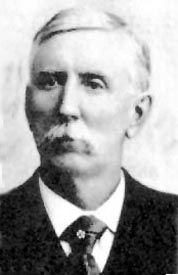
Joseph G. McCoy.
Joseph G. McCoy (1837-1915) – Founder of the cattle trade in Kansas, the originator of the Abilene Cattle Trail and cattle baron.
Kay McFarland (1935-present) – From Topeka, she was the first woman in Kansas to serve as a district judge and state supreme court justice.
Peter McVicar (1829-1903) – Clergyman, soldier, and educator
Rex Maneval (1890-1974) – From Frankfort, Maneval was an inventor and helicopter manufacturer.
John Alexander Martin (1839-1889) – The 10th governor of Kansas from 1885 to 1889.
Walt Mason (1862-1939) – A poet and humorist.
Edgar Lee Masters (1869-1950) – From Garnett, Masters was a poet and biographer.
William “Bat” Masterson (1853-1921) – Ford County sheriff, gunfighter, and friend to Wyatt Earp.
William E. Mathewson (1830-1916) – Though not as well known in history as the more famous “Buffalo Bill” Cody, the first man to hold the moniker of Buffalo Bill was William E. Mathewson, a daring explorer, hunter, Indian scout, and fighter, who did much to prepare the pathway for western expansion.
Samuel Medary (1801-1864) – Kansas’s last regularly appointed territorial governor.
Jotham Meeker (1804-1855) – A missionary at the Ottawa Mission.
Karl Menninger (1893-1990) – From Topeka, Menninger was a psychiatrist and co-founder of the Menninger Clinic and Foundation.
Josiah Miller (1828-1870) – A Free-State advocate who started one of the first Kansas newspapers.
William Mervin “Billy” Mills (1938-present) – From Lawrence, Mills was born in Pine Ridge, South Dakota, and a member of the Oglala Lakota (Sioux), he attended Haskell Institute and the University of Kansas in 1964 at the Tokyo Olympics, he became the only American to win the 10,000-meter run.
Robert B. Mitchell (1823-1882) – Soldier, Free-State advocate, and member of the first Kansas Territorial Legislature.
Harriet Earhart Monroe (1842-1927) – Monroe was a lecturer, educator, writer, and traveling producer of religious stage plays. founded the Atchinson College Institute in Atchison, Kansas.
James Montgomery (1814-1871) – One of Kansas’ most infamous “Jayhawkers.”
Henry Miles Moore (1826-1909) – An early Kansas settler, Free-State lawyer, and politician in Leavenworth.
Horace L. Moore (1837-1914) – From Lawrence, he was a banker, soldier, and member of Congress.
Edmund Needham Morrill (1834-1909) – The thirteenth governor of Kansas.
Victor Murdock (1871-1945) – Journalist and member of Congress.
N
James Naismith (1861-1939) – From Lawrence, he was the inventor of the game of basketball and a coach at the University of Kansas.
Carry A. Nation (1846 – 1911) – From Medicine Lodge, Nation was a well-known and radical temperance advocate.
Clarina I. H. Nichols (1810-1885) – A writer and lecturer, she came with her family to Kansas in 1854. She lived first at Lawrence and then at Wyandotte. She strongly advocated a more just understanding of women’s rights. She attended the meetings of the Wyandotte Constitutional Convention. She counseled the members on all matters relating to women, resulting in the Kansas Constitution being one of the most liberal in the United States at that time. Her death occurred in 1885.
O
Katherine Richards O’Hare (1877-1948) – From Ada, she was a Socialist, novelist, and anti-war activist.
Old Crow – A Crow Indian, who was allegedly one of the members of the Dull Knife band of Cheyenne, which left the reservation in Indian Territory and made the memorable raid across Kansas in September and October 1878, killing 32 citizens
Thomas A. Osborn (1836-1898) – The sixth governor of Kansas from 1873 to 1877.
John Grant Otis (1838-1916) – Lawyer and member of Congress.
P
Francisco Juan De Padilla (??-1542) – A Franciscan friar and the first missionary to the Indians of Kansas.
Charlie “Yardbird” Parker (1920-1955) – Kansas City jazz saxophonist.
Henry Clay Pate (18??-1864) – A leader of a gang of border ruffians and a newspaper correspondent.
Robert Hall Pearson (1828-??) – Pearson was one of the first settlers in Douglas County, Kansas, who fought with John Brown in the Battle of Black Jack and built a home near Baldwin City that remains today.
William A. Peffer (1831-1912) – Soldier, publisher, and United States Senator.
Frank E. Peterson, Jr. (1932-present) – From Topeka, Peterson was the first black brigadier general in the U.S. Marine Corps and NAACP Man of the Year.
John Pettit (1807-1877) – Succeeded Samuel D. Lecompte as Chief Justice of the Territory of Kansas.
Allison J. Pliley (1844-1917) – One of Kansas‘ greatest soldiers, Captain Allison J. Pliley, was famous as a scout and cavalry officer in the frontier days.
William Addison Phillips (1824-1893)- Journalist, historian, and member of Congress.
R. L. Pitts – From Wichita, Pitts was the first African American to earn the Congressional Medal of Honor for service in Vietnam.
Preston B. Plumb (1837-1891) – Lawyer, United States Senator, and founder of Emporia.
Samuel Clark Pomeroy (1816-1891) – Pioneer and United States Senator.
Paul M. Ponziglione (1818-1900) – One of the early Catholic missionaries in Kansas.
Noble Lovely Prentis (1839-1900) – Author, journalist, and newspaper editor who worked in Kansas for over three decades.
William C. Quantrill (1837-1865) – After serving as a teacher at Lawrence, Quantrill began to lead gangs of Border Ruffians in the Kansas-Missouri Border War, became a Confederate soldier during the Civil War, and was responsible for the Lawrence Massacre in 1863.
R
Charles Rath (1836-1902) – Merchant, buffalo hunter, and freighter, Rath was one of the original organizers of Ford County, Kansas.
Clyde M. Reed – From Parsons, Reed was a publisher, 24th Kansas governor, and U.S. Senator.
Andrew Horatio Reeder (1807-1864) – Free-State leader and the first governor of Kansas Territory.
Albert T. Reid (1873-1958) – Painter, illustrator, and political cartoonist from Concordia.
Charles Reynolds (1817-1885) – Writer and minister.
Milton W. Reynolds (1823-1890) – Writer, politician, and newspaper publisher.
Charles Lawrence Robinson (1818-1894) – Free-State leader and the first governor of Kansas.
Sara Tappan Doolittle Robinson (1827-1911) – Author and wife of the first governor, Charles Lawrence Robinson.
Bernard W. Rogers (1921-2008) – From Fairview, he was an American general who served as Chief of Staff of the United States Army, NATO’s Supreme Allied Commander, and Commander in Chief of United States European Command.
Christian “Jim” Roper (1916-2000) – From Halstead, in 1949, he became the first NASCAR Winston Cup Series stock car race winner.
Franklin Albert Root (1837-1926) – Author, stage messenger, and publisher.
Edmund G. Ross (1826-1907) – Journalist and United States Senator.
Damon Runyon (1884-1946) – From Manhattan, he was a short story writer and journalist.
Jim Ryun (1947-present) – From Wichita, Ryun was the WWorld’sOutstanding Athlete in 1966-1967, a three-time Olympian, set a world track record for the mile in 1966, and a member of U.S. Congress.
S
John P. St. John (1833-1916) – From Olathe, the eighth governor of Kansas, National Prohibition Party’s presidential candidate in 1884.
Susanna Madora Salter (1860-1961) From Argonia, she was the first woman mayor in the nation.
Sven Birger Sandzen (1871-1954) – From Lindsborg, he was a renowned artist and professor.
Satanta (1830-1878) – Noted Kiowa chief, frequently called the “Orator of the Plains.”
Charles F. Scott (1860-1938) – Journalist, newspaper publisher, and Congress member from Iola.
Wilson Shannon (1802-1877) – The second Territorial Governor of Kansas.
Robert Simerwell – Simmerwell was a missionary to the Potawatomi Indians in Kansas.
William Eugene Smith (1918-1978) – From Wichita, Smith was a photojournalist for Newsweek, Life, and Parade, known for humanistic photography.
Francis Huntington Snow (1840-1908) – Snow was elected to the University of Kansas’ first faculty as a mathematics and natural sciences professor in 1866. In 1870 he became a professor of natural history at the University. He organized the collecting expeditions, which resulted in the extensive natural history museums of the University. He was made Chancellor of the University in 1890, from which position he retired in 1901. He died in 1908.
John Pierce St. John (1833-1916) – The eighth governor of the State of Kansas.
William Edgar Stafford (1914-1993) – From Hutchinson, Stafford was a poet, pacifist, and 1963 National Book Award winner. He was appointed the twentieth Poet Laureate Consultant in Poetry to the Library of Congress in 1970.
Benjamin F. Stringfellow (1816-1891) – Lawyer and pro-slavery leader in Kansas.
John H. Stringfellow (1819-1905) – An early physician of Kansas, one of the founders of Atchison, a pro-slavery advocate, border ruffian, and Speaker of the House in the First Territorial Legislature.
Fred Andrew Stone (1873-1959) – Raised in Topeka, he was a famed Vaudeville song and dance man.
Earl Sutherland (1915-1974) – From Burlingame, he won the Nobel Prize for physiology and medicine in 1971.
T
Samuel F. Tappan (1831-1913) – A journalist, military officer, abolitionist, and Native American rights activist.
Lucy Hobbs Taylor (1833-1910) – From Lawrence, the first fully-trained woman dentist in the world.
Solon O. Thacher (1830-1895) – Attorney, Free-State advocate, and politician.
Timothy Dwight Thacher – (1831-1894) – Scholar, statesman, and editor.
Eli Thayer (1819-1899) – Educator, inventor, Congressman, and one of the Massachusetts Emigrant Aid Company organizers.
Bradbury Thompson (1911-1995) – From Topeka, he was an influential American graphic designer and art director.
Henry Theodore Titus (1823-1881) – A soldier and pro-slavery advocate involved in several skirmishes of the Kansas-Missouri Border War.
Clyde Tombaugh (1906-1997) – From Burdette, he was an astronomer who discovered the planet Pluto in 1930.
U-V
W
Robert James Walker (1801-1869) – The fourth Territorial Governor of Kansas.
John Lewis Waller (1850-1907) – From Lawrence, Waller was a lawyer, founded Lawrence’s first black newspaper, and was U.S. consul to Madagascar.
Bernard Warkentin (1849-1908) – Originally from Russia, Warkentin was among the Mennonite settlers who came to Kansas in 1873. He imported Turkey Red Wheat to Kansas and established a milling operation.
Hugh Sleight Walsh (1810-1877) – Secretary and acting governor of the Territory of Kansas.
Eugene Fitch Ware (1841-1911) – Nicknamed “Ironquill,” Ware was a lawyer and poet.
Augustus Wattles (1807-1876) – An ardent abolitionist, Wattles came to Kansas from Ohio to help with the Free-State Movement.
John Otis Wattles (1809-1859) – An abolitionist, spiritualist, educator, and women’s rights activist, Wattles helped to found the town of Moneka in Linn County, Kansas.
Esther Whinery Wattles (1819-1908) – Supporting temperance, anti-slavery, and women’s rights, Wattles helped her husband, John Otis Wattles, to establish the town of Moneka, Kansas, and founded the Moneka Women’sRights Association.
Julius Augustus Wayland (1854-1912) – Having his base of operations in Girard, Wayland was the founder of the Socialist newspaper Appeal to Reason.
Frederick Wellhouse (1828-1910) – Wellhouse came to Leavenworth County, Kansas, in 1859. He grew and sold fruit trees until 1876, when he planted commercial apple orchards. During the next 18 years, he planted 1637 acres of apple trees. Many years were given to experiments to determine the varieties best adapted to Kansas. He became known throughout the country and was called “The Apple King.” He was president of the State Horticultural Society for ten years and was engaged in many public activities at different times. He died in 1911.
Edward Winslow Wellington (1853-19??) – A pioneer and business of central Kansas, Wellington was a founder of and essential in developing the cities of Carneiro and Ellsworth.
William Allen White (1868-1944) – From Emporia, White was an editor, publisher, author, and Pulitzer Prize winner.
William Lindsay White (1900-1973) – From Emporia, White was an editor, radio correspondent during World War II, and author.
John W. Whitfield (1818-1879) – Indian Agent and the first delegate to Congress from the Territory of Kansas.
Daniel Webster Wilder (1832-1911) – Journalist, author, and newspaper publisher.
Charles H. Withington (1816-1881) – A blacksmith for the Sac and Fox Indians, Withington was the first white settler in Lyon County, Kansas. There, he operated a successful store along the Santa Fe Trail and served as a mail agent.
Gerald Burton Winrod (1900-1957) – Evangelist, author, and political activist.
Samuel Newitt Wood (1825-1891) – A Free-State advocate and politician, Wood was killed in the Sevens County War.
Harry Hines Woodring (1887-1967) – From Elk City, Woodring was a banker, Democratic governor of Kansas, and U.S. Secretary of War.
Daniel Woodson (1824-1994) – The first secretary and several times acting governor of the Territory of Kansas.
Henry Worrall (1825-1902) – One of Kansas’ first artists.
Lorraine Elizabeth Wooster (1868-1953) – From Beloit, in 1918, she became the first woman elected to statewide office in Kansas as State Superintendent of Public Instruction.
Richard Francis Yeager (1839-1864) – Better known as Dick, Yeager was a Confederate guerilla who joined up with William Quantrill during the Civil War. He is known for a daring raid near Council Grove, Kansas, on May 4, 1863, and was part of Quantrill’s raid on Lawrence, Kansas, on August 21, 1863.
Compiled and edited by Kathy Alexander/Legends of Kansas, updated August 2024.
Also See:

